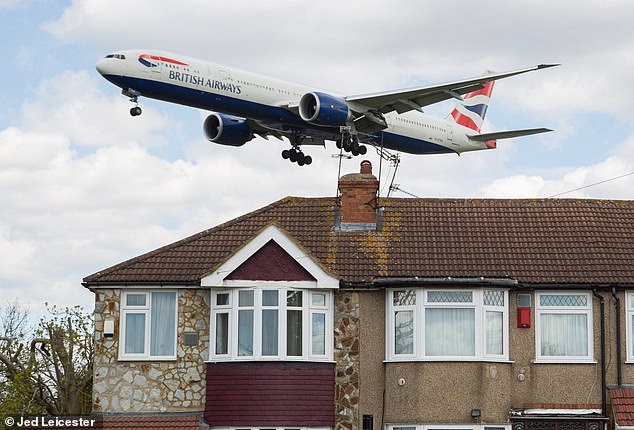If you live near an airport, it might be wise to invest in a decent pair of earplugs – because the noise of departing aircraft is set to get even worse.
Scientists warn that flights departing from UK airports including London City, Heathrow and Gatwick will get louder due to climate change.
The experts from the University of Reading say the warmer air resulting from climate change reduces the lift force on an aircraft shortly after take–off.
This reduces the aircraft’s climb angle, keeping aircraft closer to the ground for longer periods after departure.
Because of the shorter distance between houses and newly–departed planes, residents near airports will be increasingly plagued by the annoying hum of a jet engine.
Professor Paul Williams, study author at the University of Reading, warns of ‘unwelcome consequences for those who live near airports and are impacted by noise’.
The study shows global warming will make commercial flights more problematic for people on the ground, not just those in the air.
‘Together with increased turbulence and more airport flooding, we can now add noisier flights to the growing list of ways climate change is affecting aviation,’ he said.

The warmer air resulting from climate change reduces the lift force on a departing aircraft, potentially reducing its climb angle and causing more engine noise near the airport. Pictured, a BA plane above houses near Heathrow
The study focused on the impacts of climate change on aircraft noise at 30 European airports across June, July and August.
The airports studied included three London airports, as well as Dublin Airport, Brussels Airport, Amsterdam Airport Schiphol, Lisbon Portela Airport and Zurich Airport.
The team focused on climb angles of the Airbus A320 – a narrow–body airliner commonly used for short European flights.
Using climate projections, they estimated how climb angles will change in a future, warmer climate.
On average, departing aircraft climb angles will decrease by one to three per cent, according to the findings, but individual hot days could reduce climb angles by up to 7.5 per cent.
Warmer air is less dense, meaning there’s fewer air molecules in a given volume, and this makes it harder for planes to generate lift.
The team write: ‘Air density shows an overall decrease, largely due to increased temperatures. This then leads to smaller climb angles and an increased noise pollution footprint.’
The researchers estimate that the number of people affected by noise pollution could increase by up to four per cent by 2050.

The team focused on the 50 decibel (dB) noise footprint, which marks a boundary where aircraft noise becomes more noticeable to residents. Pictured, extent of the 50, 55, and 60 dB contours around London Heathrow Airport
In central London, around 60,000 people currently live within the 50 decibel (dB) noise footprint of a typical A320 aircraft.
But changes in local climate and population density could mean roughly 2,500 additional people being brought into this boundary by 2050.
What’s more, noise pollution changes will be ‘maximised for the most damaging and psychologically “annoying” (low) frequencies’, the team warn in their study, published in the journal Aerospace.
Low–frequency noise, which travels further, will increase the most – and unfortunately it is a particularly persistent and invasive low–frequency hum.
‘Over the next three decades, thousands of extra people in London could be blighted by noise pollution caused by climate change,’ said Dr Jonny Williams, lead author at the University of Reading.
‘The problem gets worse with different types of sound too… deeper sounds are particularly annoying to human ears and can cause stress and sleep problems.’
The scientists say reducing greenhouse emissions, which largely come from burning fossil fuels like coal and gas, will curb the issue.
‘Without action on greenhouse gas emissions, rising temperatures will make managing the problem of airport noise more difficult, even as engine technology advances,’ added Dr Williams.
Dr Williams said this study is the first peer-reviewed study to quantify this effect where climate change means more noise pollution for residents near airports.
University of Reading research has already showed that commercial flights will get more bumpy in the decades to come due to global warming.
A warming atmosphere causes disturbances to the jet stream – the narrow current of fast–moving air that planes fly along to get a speed boost.
In their new paper, the experts warn of ‘profound implications for aviation safety,’ as turbulence–related injuries become more common.
Climate change may also mean more airport flooding; according to a 2020 study, sea level rise associated with a global mean temperature rise of 2°C/3.6°F would place 100 airports below mean sea level.
This article was originally published by a www.dailymail.co.uk . Read the Original article here. .

